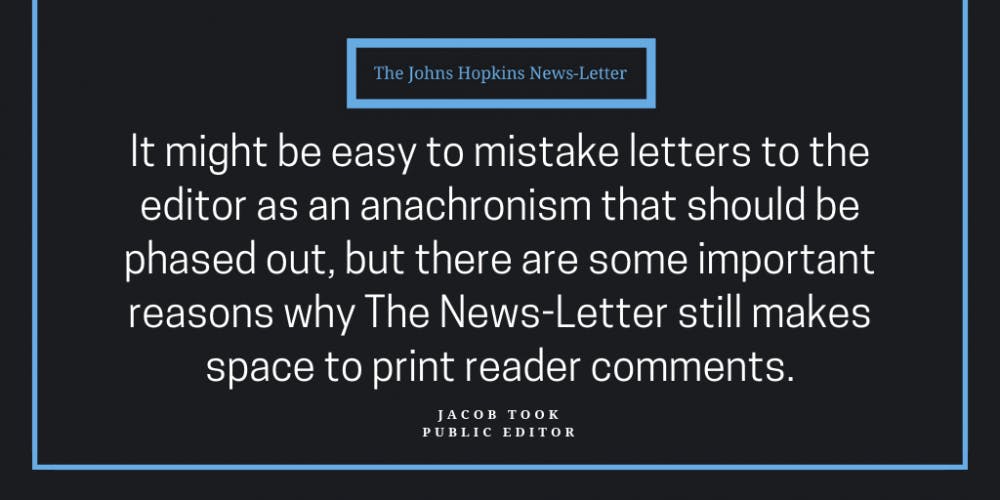
The News-Letter got a letter to the editor this week. It’s the first in quite a while — the first this calendar year, actually. In the last two years, the paper has only received 11 letters to the editor, three of which responded to a particularly spicy op-ed arguing that conservatives’ free speech was under attack. This made me wonder: what exactly is a letter to the editor?
Lacking a range of recent examples, I turned to a few random issues from 1978. In each, I found a handful of letters on a range of topics. Some respond to content published in The News-Letter. Others respond to previous letters to the editor. Many just offer comment on campus events, the administration or local and national news. One is just a single sentence congratulating some guy for having a really good Christmas tree.
Through letters to the editor, The News-Letter facilitated a dialogue between students that could only otherwise be carried out face-to-face. Why doesn’t the paper get so many letters anymore? These days, Facebook comments make it so much easier to be part of that larger conversation without going to the lengths of writing and submitting a letter.
It might be easy to mistake letters to the editor as an anachronism that should be phased out, but there are some important reasons why The News-Letter still makes space to print reader comments.
On one level, it’s about accountability — if the letter responds to content, corrects a perceived error or deficit in coverage or criticizes the paper in another way, The News-Letter can publish that letter as part of an effort to hold editors accountable going forward. In the weeks following some of the paper’s more egregious past mistakes, letters to the editor have flooded the page — it’s pretty impressive to see so many readers voices represented together.
Editors do look at and talk about Facebook comments, but sometimes it’s hard to tell serious concern apart from mansplaining or bullying. We all know how easy it is to rant online, but taking the time to type up a letter to a real person with your name attached lets you consider your thoughts more carefully. When The News-Letter publishes letters to the editor, the paper creates a space for total strangers to engage in a healthy dialogue.
And in a stodgy defense of print journalism, there’s something so permanent about being part of a dialogue that isn’t just stored in a server somewhere. Holding your words in your hand, running your fingers over the printed letters, you know that your perspective is part of the historical record of Hopkins students. You are part of the institutional memory that The News-Letter seeks to safeguard.
It seems natural for the Public Editor, as a reader representative, to serve as a touch point for letters to the editor. They offer a way to represent student voices, a way for readers to hold editors accountable for their mistakes. That’s totally in my wheelhouse — my role seeks to make sure that criticism and concerns from readers build toward long-term improvements to the paper’s practices and content.
I’m happy to field letters to the editor, and I can be a second reader if you want feedback on your letter from someone removed from The News-Letter’s behind-the-scenes. But that’s not all letters to the editor can be. They can be a way for readers to engage directly with editors, writers and other readers. I’ll follow up on criticisms in letters to the editor, but I don’t necessarily need to be part of that conversation.
And if you feel like leaving a comment on Facebook is just shouting into the void, but you’re not quite at the point of writing a full-on letter to the editor, there is a middle ground! Why not email me, Facebook message me or even just drop me a Twitter DM? If you want to make sure someone hears your concerns, but you’re not looking to jump into that bigger conversation yourself, get in touch and let me be the middleman!
We want you to be part of this conversation! We encourage all our readers, and particularly members of the Hopkins and Baltimore community, to email publiceditor@jhunewsletter.com with questions or comments about our practices and published content.





